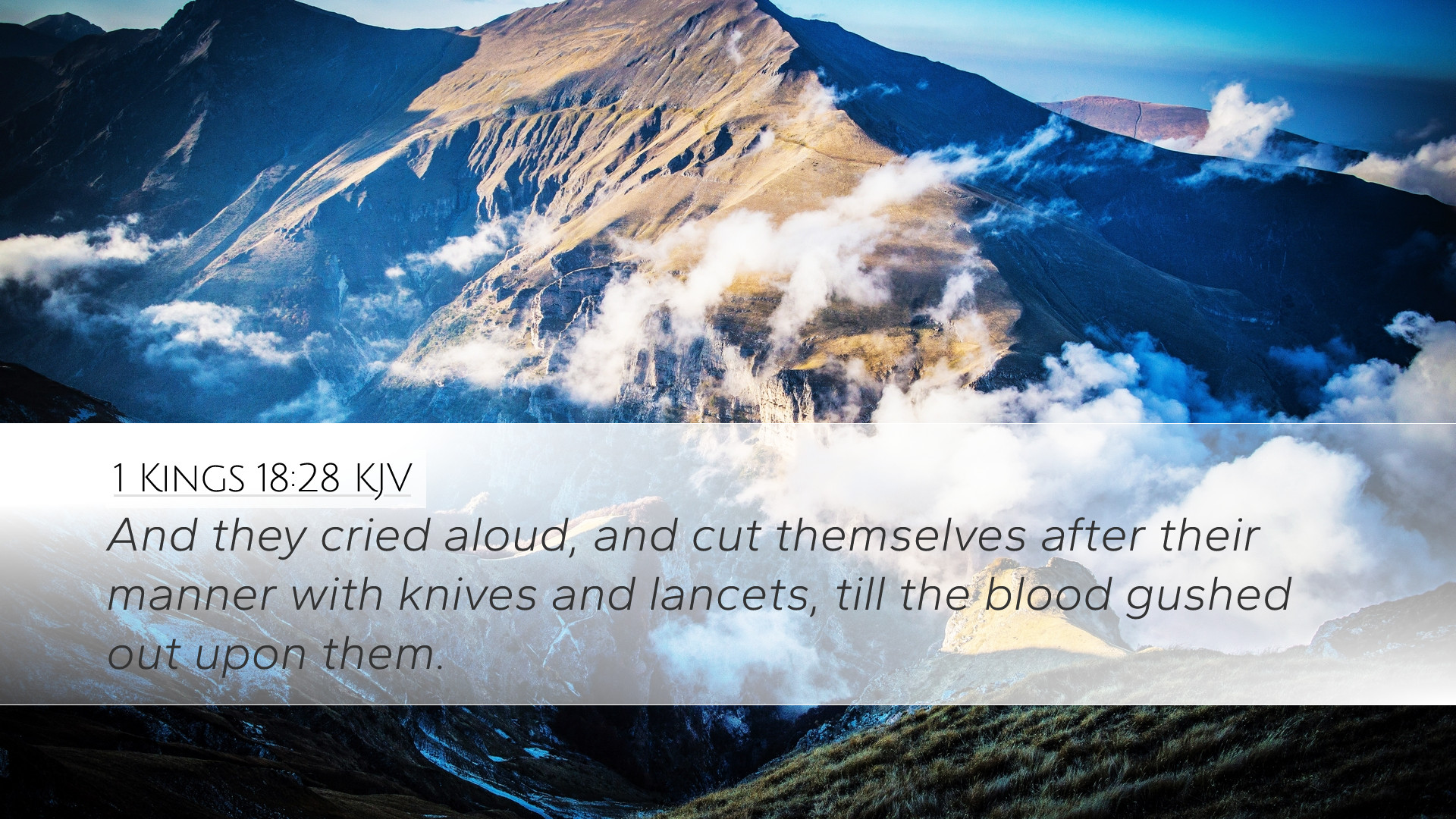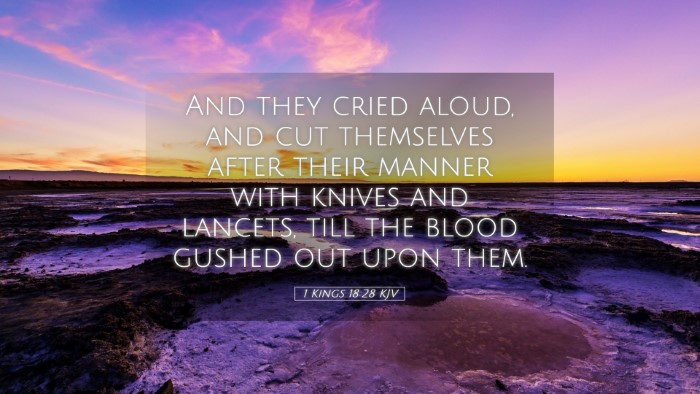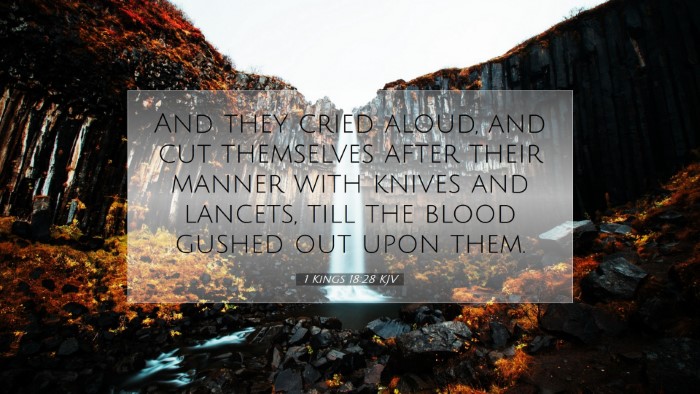Commentary on 1 Kings 18:28
Verse Context: 1 Kings 18:28 states, "So they cried aloud, and cut themselves after their manner with knives and lancets, till the blood gushed out upon them." This verse describes a pivotal scene in the contest between Elijah and the prophets of Baal on Mount Carmel. Here, the prophets of Baal engage in a frantic display to solicit fire from their god, evidencing extreme measures to demonstrate their devotion.
Introduction
This verse serves as a grim depiction of the depths of idolatry and the desperation that accompanies it. The actions of the prophets reflect not only their fervent belief in Baal but also the extreme lengths to which they would go to obtain a response from a seemingly silent deity. The text invites reflection on human psychology, the nature of true worship, and the futility of false religion.
Insights from Matthew Henry
Matthew Henry emphasizes the absurdity of the prophets' actions, noting that they resorted to self-mutilation in an earnest attempt to attract Baal's attention. He highlights the intense psychological state of these prophets, consumed by their desperation.
- Desperation of the False Prophets: Henry argues that their desperate cries and self-harm reveal a profound estrangement from the true living God. It exemplifies how far one's heart can stray in pursuit of a false sense of security and power.
- Emphasis on the Physical: The act of cutting themselves underscores the physical manifestations of spiritual desperation. Henry connects this behavior to the broader scriptural principle that those who worship idols often suffer from spiritual blindness, often leading to harmful practices.
- Contrast to True Worship: Henry presents a stark contrast between the chaotic worship of Baal and the calm assurance demonstrated by Elijah. This juxtaposition highlights the efficacy of true prayer and reliance on God, which does not depend on frantic displays of devotion.
Insights from Albert Barnes
Albert Barnes provides a detailed analysis of the implications of this verse. He notes that the prophets of Baal's method of seeking answers—crying aloud and wounding themselves—demonstrates a profound misunderstanding of divine engagement.
- The Folly of Idolatry: Barnes comments on the folly inherent in idolatry; he asserts that these actions perform no true function in securing a response from Baal, as he is not a living deity. The futility of their rituals serves as a caution against relying on anything other than the true God.
- Rituals vs. Relationship: The commentary draws a distinction between ritualistic worship and a genuine relationship with God. Barnes asserts that true God does not require such displays; rather, He seeks a sincere heart and earnest prayer.
- The Cultural Context: He further explains that this kind of self-harm was not uncommon in pagan worship cultures, pointing to how societal pressures often drive individuals to conform to disturbing practices in pursuit of corporate approval or divine favor.
Insights from Adam Clarke
Adam Clarke offers a more theological reflection on the conditions of the prophets’ actions, exploring the implications of their behavior in light of the covenantal relationship between God and Israel.
- Prophetic Response: Clarke emphasizes that the prophets’ desperation can be viewed as a prophetic response to a breaking point in Israel’s relationship with God. Their actions starkly contrast with the covenant bond that once brought Israel prosperity and peace.
- The Nature of Divine Silence: He elaborates on the theme of divine silence in the face of idolatry, demonstrating how those who turn from God may perceive His absence, resulting in desperate attempts to seek alternate means of divine favor.
- Teaching Moment: Clarke notes that this moment serves as a significant teaching opportunity. It not only addresses the immediate context of worship but also illustrates broader truths regarding faith, reliance, and the nature of God's responsiveness versus the emptiness of idolatrous practices.
Theological Reflections
As we analyze 1 Kings 18:28, several theological reflections arise:
- The Nature of God: This verse invites us to reflect on the nature of God as responsive to true faith and prayer, contrasting with the lifelessness of idols that demand chaos and violence to evoke a response.
- Human Desperation: The actions of the prophets illuminate a profound truth about human desperation. When stripped of divine guidance, people can resort to harmful measures in the search for meaning, acceptance, and connection.
- The Call to Authentic Worship: This passage ultimately calls for a return to authentic worship—one marked by honesty, relationship, and the pursuit of the living God rather than rituals that lack intent or heart.
Conclusion
1 Kings 18:28 serves as a profound reminder of the contrasts between the living God and the false gods that many pursue. The self-inflicted wounds of the Baal prophets illustrate a desperate reach for divine approval that ultimately reflects the emptiness of their chosen path. For pastors, students, theologians, and Bible scholars, this passage encourages deep contemplation about the nature of worship, the hazards of idolatry, and a call towards authentic living in a relationship with the Creator.


